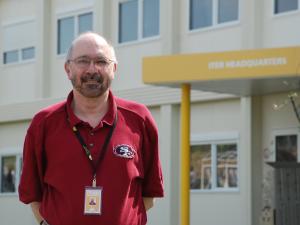An ambassador for magnets
2 Jul 2010
-
Krista Dulon
As Senior Magnet Coordinator, Cesar plays a central role in the coordination of all the technical activities of the Magnet Division.
As a student of engineering in Montevideo, Uruguay in the 1970s, nothing predestined Cesar Luongo for a coveted position in Stanford University's graduate engineering programs. Nothing, that is, except ambition, confidence in his abilities and exceptional scores on the requisite entrance examinations.
"Uruguay was not on the map for US universities at that time at all ... we suffered from a total lack of visibility. I was the first student from Uruguay to ever be admitted to the Stanford Engineering School. Once there, of course, I didn't want to go down in history as the first and last Uruguayan student ... I felt like I had the weight of an entire country on my shoulders!"
With characteristic thoroughness, Cesar consigned to paper everything learned during his bid for admittance to Stanford in the hopes that it would serve other students ... and it did. Classed on the shelves of the University of Uruguay library, his 30-page, hand-written booklet filled with flow diagrams helped three generations of Uruguayan students find their way into graduate programs in the US.
"I keep in touch with those who followed in my footsteps," says Cesar. "I'm a bit of a mentor to them. They're scattered all over the world now—some as professors in Hong Kong, New York, or Strasbourg, others working for Hewlett-Packard or Exxon ..."
Cesar excelled at Stanford, studying magnetohydrodynamics and earning Master's and PhD degrees in mechanical engineering. Directly out of graduate school he joined the Bechtel Corporation in San Francisco where he remained a total of ten years, working on the analysis and design of large-scale superconducting magnets and becoming familiar with the team-based design processes used in industry.
He left Bechtel and the private sector in 1999 to become Professor of Mechanical Engineering, Associate Chair and Graduate Program Coordinator at Florida State University (FSU)—home to the National High Magnetic Field Laboratory. He received the Chair's Award for Excellence in Teaching in 2002 and the Dean's Award for Exceptional Research Productivity in 2007.
On the occasion of a one-year sabbatical from FSU, he joined the Magnet Division at ITER in 2008. "Coming to ITER, where the world's largest magnet system is being designed and built, was a once-in-a-lifetime opportunity for me. The ITER Tokamak is very complex and the challenges are enormous—any engineer would want to be a part of that," says Cesar.
One year turned into two ... and in June 2010, Cesar became a member of ITER staff.
As Senior Magnet Coordinator, Cesar plays a central role in the coordination of all the technical activities of the Magnet Division. He supports the Sections in the preparation of documentation for design reviews and Procurement Arrangements, and in the definition and tracking of the interfaces that exist between the ITER magnets systems, and between the magnets and other systems.
"There is a good part of negotiation inherent to my job," explains Cesar. "I'm the ambassador of the Magnet Division when it comes to interacting with other systems, and I believe my experience in private industry and as a university professor has been very relevant. I used to tell my students that engineering design is not only a technical but also a social activity ... ultimately, it's all about the issues of how to integrate a complex design in the context of a team effort, so there is always a very important human element involved."
Moving to France has been a second emigration for Cesar and although he speaks Spanish and English, he doesn't yet master French. "I come from a country which was built by immigrants so the mentality still is—you go where you think you can make a better life for yourself," says Cesar. He and his wife enjoy 'a simpler lifestyle' in Aix—no car, lots of walking—and their apartment under the eaves in a building formerly owned by the Cézanne family. Two grown children back in the United States are entering graduate programs this year, one in neurobiology and the other in mechanical engineering.
At ITER, Cesar enjoys working with colleagues encountered in the field of magnets and applied superconductivity over the years, and the fast-paced, dynamic environment ... "there's not much time to get bored!" As for the occasional pastime, Cesar is rumoured to be a fine connoisseur of jazz ...


